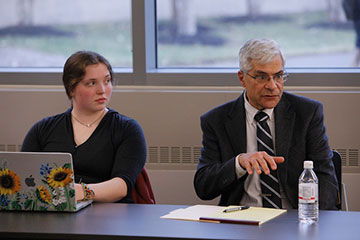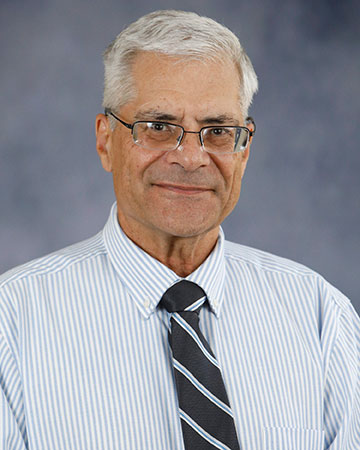
03/05/2024
John Suarez, director of SUNY Cortland’s Institute for Civic Engagement, has been chosen as a fellow for the State University of New York’s new Civic Education and Engagement and Civil Discourse Initiative.
SUNY Chancellor John B. King, Jr. today announced that the inaugural class of 10 fellows will advance the 64-campus system’s commitment to civic engagement as an essential outcome of higher education.
“SUNY is committed to being a place of inclusion and inquiry,” King said. “SUNY’s colleges and universities have long been bastions of civic engagement and civil discourse where students learn to become better, more engaged citizens as part of the path to academic achievement,”
Suarez will work to promote civil discourse among students, faculty, and staff across campus communities while helping to implement an updated general education framework.
When Suarez heard the announcement, he said he was humbled and honored, knowing who he would get to work with.
“There are ten of us altogether who are on this fellowship,” said Suarez, noting the caliber of the other fellows. “They represent some heavy hitters from a variety of disciplines, so I'm really excited about joining this and participating in the work.”
The chancellor cited Suarez’s “dedication to fostering civil discourse” as a major reason for his selection.
"Each of the 10 fellows have extraordinary accomplishments and their collective experiences will help ensure SUNY continues to lead in promoting civic engagement across the system and inspiring generations of socially responsible SUNY graduates,” King said.

Through Cortland’s own Institute for Civic Engagement, Suarez leads projects including Dragons For Democracy, the school’s Action Team Interns, and the Leadership in Civic Engagement and Leadership in Democracy Engagement awards, which encourage students, staff, faculty and the wider community to listen, learn and volunteer.
“I'm proud of the folks that I work with that include not only faculty and staff but also students, many of whom are deeply engaged and addressing challenges that we face,” Suarez said.
Suarez, whose department also helped begin the SUNY Cortland Cupboard food pantry, said that, at Cortland, what sets civic engagement apart is learning by doing.
“The key here is that with volunteering, there's not necessarily any intentional learning,” Suarez said. "But, with reflection, we can learn."
As an example, he noted that he once helped pack sandbags to prevent flooding on a lake. Suarez knew he was helping but realized that, without reflecting, he wasn't learning about the situation itself.
“I'd go back to my apartment and have lunch or dinner without thinking about why people are putting their homes there. What's going on with insurance? What might be what's going on climate-wise that might be contributing to this? I wasn't thinking about that. I wasn't learning anything about that. As opposed to civic engagement ... that means, essentially, learning by doing.”
According to research conducted by the American Association of Colleges and Universities, civic engagement by college students has led to improved graduation and retention rates. It can increase career-related skills that set students up for success upon graduation, as well as an increase in social responsibility.
As a fellow, Suarez looks forward to helping the SUNY system and its campuses incorporate ideas that encourage listening to and understanding different viewpoints, both in and out of the classroom. He’s taken similar steps at Cortland by working with Associate Professor Jill Murphy, chair of the Health Department, to found a campus chapter of the Heterodox Academy, a nonprofit with the goal of using open inquiry, viewpoint diversity, and constructive disagreement to bolster higher education and academic research.
Suarez noted that other resources like the American Democracy Project are on campus to encourage civic learning and acceptance of different points of view.
“That has drifted away from our educational system from K through 16 and past that,” Suarez said. “It's also something that has drifted away from our culture. Not only campus culture, but culture across our country.”
Suarez encouraged anyone interested in contributing to the community to learn about local not-for-profit agencies and become a board member, attend city council meetings to learn about local issues or to reach out to the Institute for Civic Engagement.
“This is who we're supposed to be as a public institution,” Suarez said. “Not only for the purpose of having students learn how to learn and enjoy learning. Not only for the purpose of students being able to develop technical and transferable skills that they can apply in their professions. But also, to have them develop the motivation to use those skills in civic decision making, address whatever the challenges might happen to be and, at the same time, be open to other ideas.”